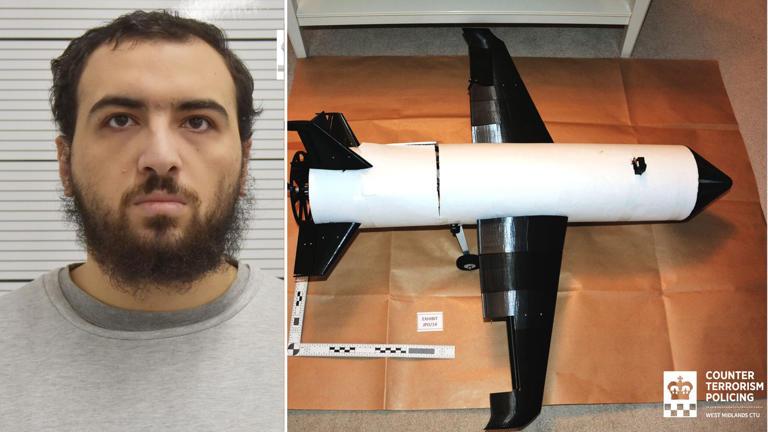
PhD engineering student designed ‘kamikaze’ drone for ISIS
Mohamad al Bared, 26, a PhD engineering student from Coventry, adapted a fixed-wing drone to deliver an explosive warhead over a distance of 8km.
He copied the design of a Tomahawk missile and produced the wings on a 3D printer, sending weekly updates to ISIS, so they could be replicated.
The mechanical engineering graduate was remanded in custody after being found guilty at Birmingham Crown Court of preparing acts of terrorism between January 2022 and January this year, and will be sentenced at a later date.
Al Bared, whose parents were both doctors, completed an engineering degree at Coventry University, a master’s degree at Warwick University and he was studying for a PhD at Birmingham University, while also teaching undergraduates.
He was described by Michelle Heeley KC as a “mild-mannered academic”, while friends said he was “kind and thoughtful” and a keen gardener, who regularly shared fruit and vegetables from his allotment.
But behind closed doors he was downloading ISIS beheading videos, and reading ISIS magazines and their newsletters.
“They show a mindset, someone who revels in violence, supports the killing of non-believers, and who is actively planning to travel to where Islamic State needs him,” Ms Heeley said.
Al Bared had designed a “kamikaze” single-use drone, designed to fly into a crowd, a building or a dam, taking inspiration from Russia’s attacks in Ukraine, the prosecutor told the court.
It had capacity to carry a thermos flask of chemical weapons or explosives that could have killed multiple people if it was flown into a crowd.
“It was a prototype being developed, something that could easily be built in the field, by the ‘brothers’, each drone being sent on its way to kill innocent people,” said Ms Heeley.
“There were reports about how far it could fly, about the technical details, about the explosive head. This wasn’t a drone that he was developing for fun, this was a weapon.”
His parents were both in court as al Bared was found guilty of preparing acts of terrorism by researching and developing an unmanned aerial vehicle, sharing technical design details and registering a UK company as false cover for travel abroad to join ISIS.
His mother broke down and had to be helped from the courtroom.
The judge, Paul Farrer KC, told him: “You have been convicted of an offence of the utmost gravity, a long prison sentence is the inevitable consequence of that but the length and nature of that sentence is a matter for careful consideration.”
Det Chief Supt Mark Payne, head of Counter-Terrorism Policing West Midlands, said al Bared was a “really, really dangerous individual who was quite some way towards helping to instigate an attack by ISIS”.
He said he believed the drone was a “proof of concept to enable them to upskill their assets and deliver attacks in a different way.”
“Anybody who has the qualifications and the knowledge and the skills that he has, that gives them a dimension that they don’t seem currently to possess,” he said.
“He’s a prized asset and somebody who, I’m sure, would be very valuable to them.”
Source » msn.com





